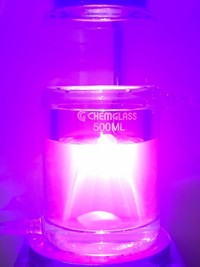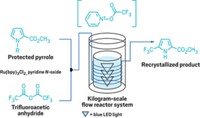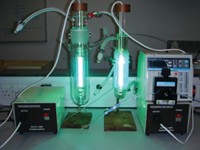Advertisement
Grab your lab coat. Let's get started
Welcome!
Welcome!
Create an account below to get 6 C&EN articles per month, receive newsletters and more - all free.
It seems this is your first time logging in online. Please enter the following information to continue.
As an ACS member you automatically get access to this site. All we need is few more details to create your reading experience.
Not you? Sign in with a different account.
Not you? Sign in with a different account.
ERROR 1
ERROR 1
ERROR 2
ERROR 2
ERROR 2
ERROR 2
ERROR 2
Password and Confirm password must match.
If you have an ACS member number, please enter it here so we can link this account to your membership. (optional)
ERROR 2
ACS values your privacy. By submitting your information, you are gaining access to C&EN and subscribing to our weekly newsletter. We use the information you provide to make your reading experience better, and we will never sell your data to third party members.
Synthesis
A small-scale reactor for light-driven chemistry
Benchtop setup standardizes conditions for photochemical reactions, boosting reproducibility between research groups
by Bethany Halford
May 22, 2017
| A version of this story appeared in
Volume 95, Issue 21
Seeking a way to standardize light-driven chemistry, researchers at Princeton University, led by David W. C. MacMillan, teamed up with scientists and engineers at Merck & Co., led by Ian W. Davies, to create a small-scale reactor to use for photochemical transformations (ACS Cent. Sci. 2017, DOI: 10.1021/acscentsci.7b00159). When a new reaction fails or performs poorly, there can be some ambiguity as to why that is, Davies explains. “We wanted to remove that ambiguity so that when we set up reactions and report them, they are set up consistently and are reproducible,” Davies says. The resulting reactor turns out to speed up many known light-driven reactions and boosts yields to boot. The researchers attribute this ability to the reaction vessel’s increased and highly uniform exposure to photons in the reactor. The system works with vials ranging from 2 to 40 mL. Different light sources can be swapped out, so photochemistry can be done at different wavelengths. Merck has made the reactor plans publicly available, so any company could commercialize it. One company, Penn Optical Coatings, is currently taking orders for the reactor and plans to begin shipping it in August at a cost of $4,900 per reactor.





Join the conversation
Contact the reporter
Submit a Letter to the Editor for publication
Engage with us on Twitter